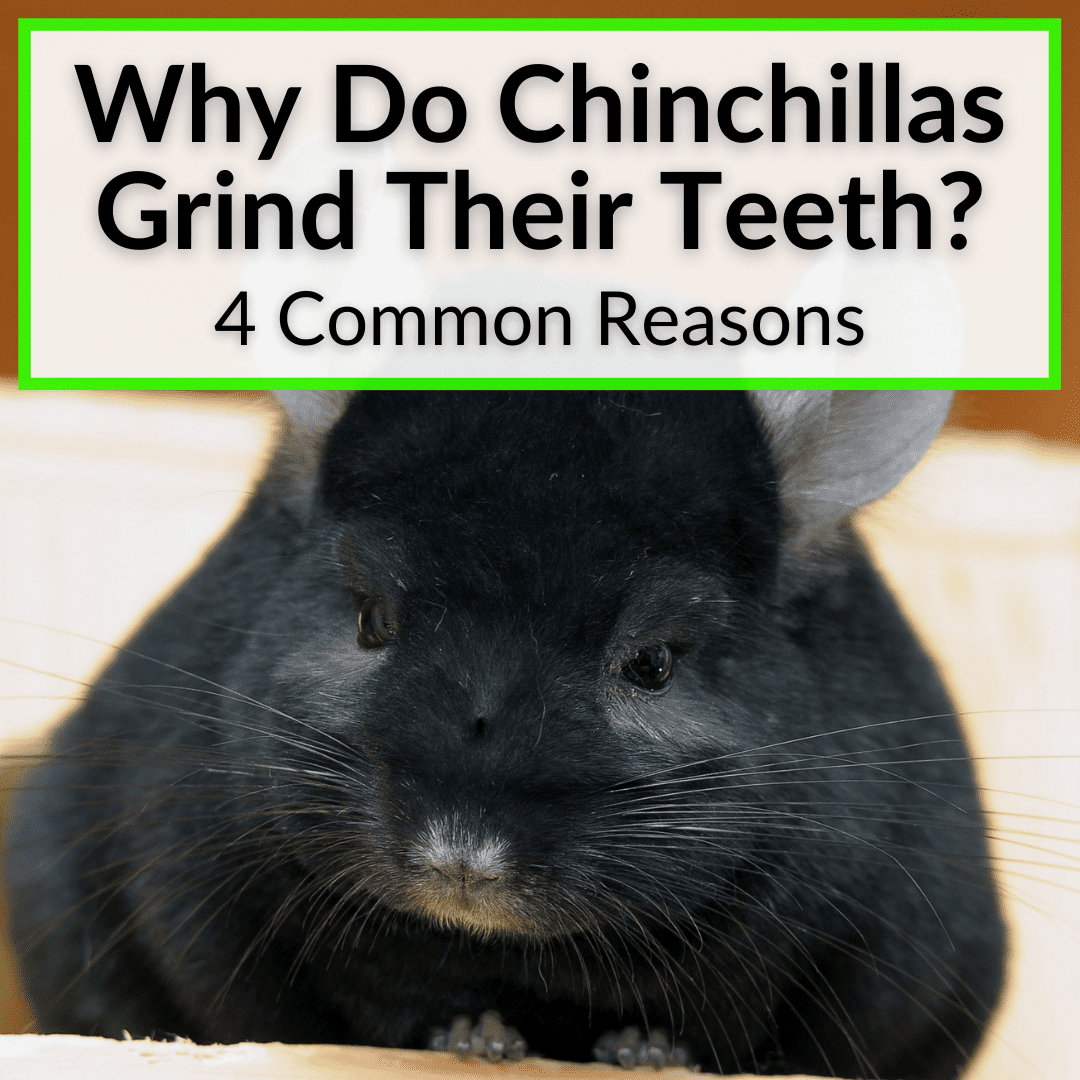
First of all, do not panic.
This behavior is not especially unusual.
And most of the time, it is nothing serious and something you can easily remedy.
But it can also indicate a more serious problem.
Keep reading to learn the primary reasons chinchillas grind their teeth and what you should do to remedy the situation for each case.
We’ll also cover how to tell which of the reasons is causing your chinchilla to grind its teeth, because this is not always so easy.
Contents
Why Do Chinchillas Grind Their Teeth?
Chinchillas might grind their teeth due to stress, due to pain, to express emotions like happiness, or for no apparent reason at all.
While chinchillas are one of the most social and friendly creatures you can adopt as pets, this doesn’t stop them from sending us mixed signals from time to time.
Things tend to become easier to understand after owning a chinchilla for a longer time, but not always. Circumstances still arise when it’s not so easy to figure out why your chinchilla is doing one thing or another.
And a chinchilla grinding its teeth is undoubtedly one of those behaviors. It can leave even experienced chinchilla owners confused about what to do.
But don’t worry, that’s what we plan on helping you with today.
First of all, if your chinchilla is currently grinding its teeth, don’t panic. Most likely it is nothing to worry about. That said, it could be something more serious, so we want to rule anything like that out.
To that end, let’s take a closer look at the 4 most common reasons a chinchilla might grind its teeth.
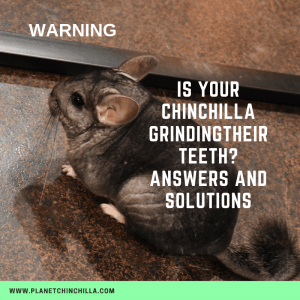
😕Adopting and caring for a new chinchilla can be intimidating and confusing. But it does not have to be.
Be sure to check out my full digital eBook “Avoiding Critical Mistakes: Ultimate Chinchilla Care eBook” to get the best advice, tips, and tricks and supply recommendations to make adopting and caring for a chinchilla much more comfortable and easier to understand.
You can learn more about this eBook offer using the link directly below.
Learn more here:👉 Avoiding Critical Mistakes: Ultimate Chinchilla Care eBook Offer
Top 4 Reasons For Chinchilla Tooth Grinding
Here are the top 4 reasons your chinchilla may be grinding their teeth with a detailed summary of each. I’ll also give you possible solutions you can try to put an end to the teeth grinding.
Reason 1: Stress
Stress is the primary reason your chinchilla might grind its teeth. Of course, stress can occur for several different reasons.
It is usually the result of your chinchilla adjusting to a new environment. For instance, when you bring your chinchilla home for the first time, wen you move to a new home, or simply when you move the cage to a new room.
Chinchillas are very particular about their surroundings and are creatures of habit. They need cold temperatures and quickly get used to their surroundings, including the things they can smell, hear, and what they see.
If your chinchilla is frightened by a new environment, it’s possible it will begin grinding its teeth. If you notice tooth grinding and there has just been a change in environment, do your best to comfort your chinchilla.
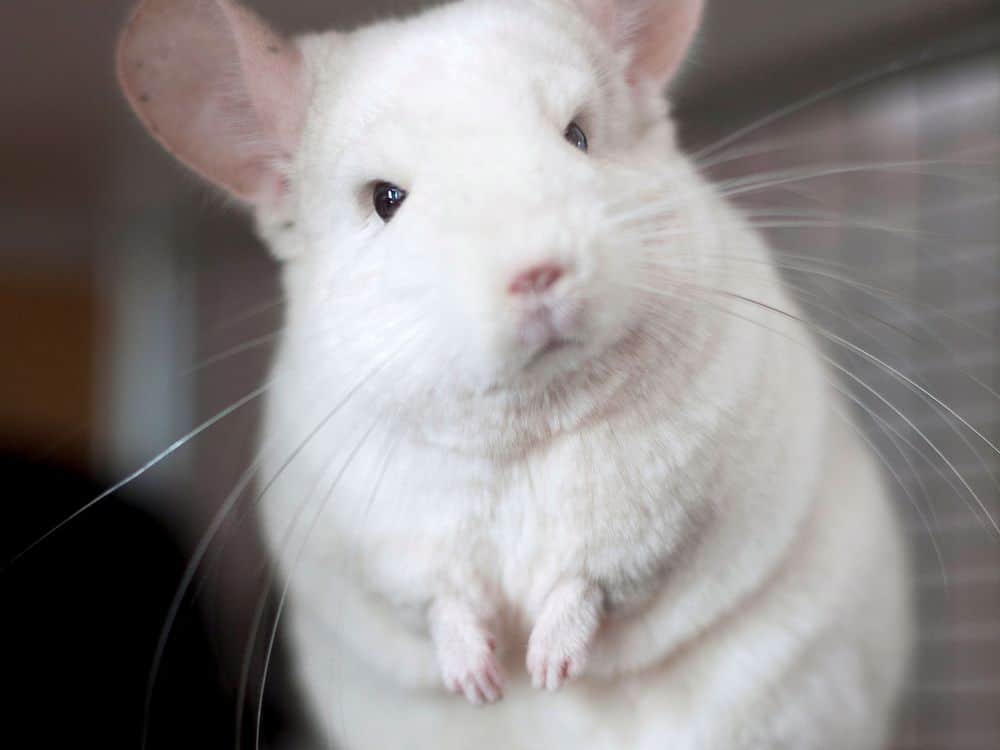
Get your chinchilla out of the cage and interact with it as much as possible. Attempt to interact and handle it in a calm manner.
Don’t fear handling and interacting with your chin. A chinchilla will not bite in most circumstances (although it is possible).
The point I am trying to make here is simple.
If you notice your chinchilla grinding its teeth and you are relatively certain that it is due to stress, do your best to accommodate.
Make sure your pet seems comfortable in its environment, reduce the stress as much as possible and see if the tooth grinding eventually comes to an end.
Take Things Slow And Give It Time
Whenever there is a change in environment, allow your chin frequent opportunities to get to know its new environment. Maybe for the first few weeks, you can clean the cage more often and let your chinchilla come out for dust baths during cleaning time.
The more your chinchilla interacts in the new environment, the sooner you can put an end to any tooth grinding that resulted fromt he stress of the change.
But don’t force anything, if your pet does not seem ready. Give your chinchilla time to adjust and to allow its anxiety and stress levels to drop. Sometimes it happens very quickly, and sometimes it can take weeks or even months.
Respecting your chinchilla’s space and feelings during this time is imperative. Another big thing you can do to help your chinchilla adjust more quickly to being in a new home or getting used to you as the owner is to get a chinchilla playpen.
This allows for a smaller, safe space for your chinchilla to interact and get to know you. It also eliminates the need for you to fully chinchilla proof a room in which your pet can play.
I believe chinchilla playpens are highly-underrated and do a fantastic job at building the bond with your chinchilla much faster, and making your chin much more comfortable. This, in turn, may reduce the stress and the teeth chattering taking place.
I currently use the Jespet 61 inch playpen. You can read about it is my article on the best chinchilla playpens. It is the top choice in the article. I have been using it for 4 years now and have had zero issues with it.
If your chinchilla is grinding its teeth and stress seems to be the cause with no end in sight, consider a chinchilla playpen to help with this issue.
Reason 2: Illness Or Pain (Tooth Or Non-Tooth Related)
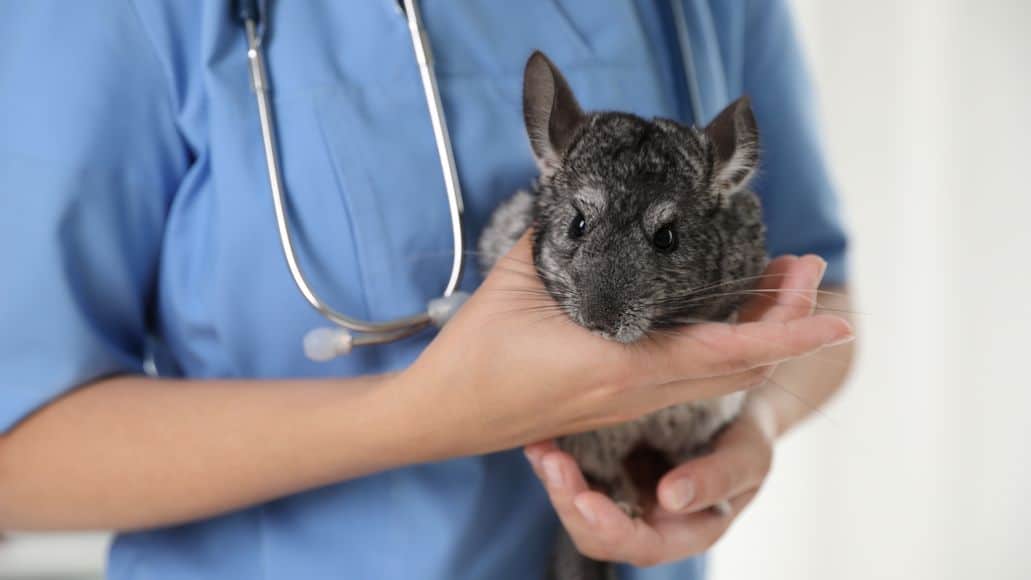
Now for the bad news. Sometimes your chinchilla will grind its teeth due to an illness or overgrown teeth. That is why it is so important always to allow your chinchilla the ability to chew and file down its teeth.
Chewing on chinchilla safe toys is what enables chinchillas to naturally grind their teeth down and keep their teeth healthy. You can view my post about the best chinchilla toys here.
You can also view my post about the best chinchilla accessories here.
If your chinchilla isn’t grinding its teeth and you are merely completing early research in case it ever happens in the future, you can help avoid this problem providing your furry friend some safe chinchilla toys to chew in its cage.
Hay cubes and wood sticks are some of a chinchilla’s most desired items to chew.
Just be careful when they are out for playtime. Chinchillas love to explore, jump and climb. You need to make sure the room is safe, and your chinchilla can’t access dangerous items that they could chew, like electrical cords or wires.
You also want to ensure that the wood items you offer your chinchilla are safe. You can view my detailed guide about which woods are safe for chinchillas here.
Be Proactive If You Believe Illness Is Causing The Tooth Grinding
If your chinchilla is grinding its teeth and you don’t believe it’s a tooth issue, but some other pain causing the grinding, you need to contact a vet.
Chinchillas with illnesses tend to get worse rapidly, so it’s essential to be proactive.
Often if your chinchilla has teeth related health issues, you will notice an odor emitting from your chinchilla. That is a good way to tell whether it is a tooth issue or some other illness.
You should also read about chinchilla malocclusion to learn to recognize the symptoms of this common issue. And if your pet come down with a tooth abscess, learn about chinchilla abscess treatment. Basically, get your pet to the vet.
And, breathe easy, don’t worry about odors. Chinchillas actually do not emit odor unless they have such an illness. They poop and pee like other rodents, but they remain odorless, if you take care of them. Your main task is to clean the cage an adequate amount of times per week.
Reason 3: Boredom (I.E. No Real Reason)
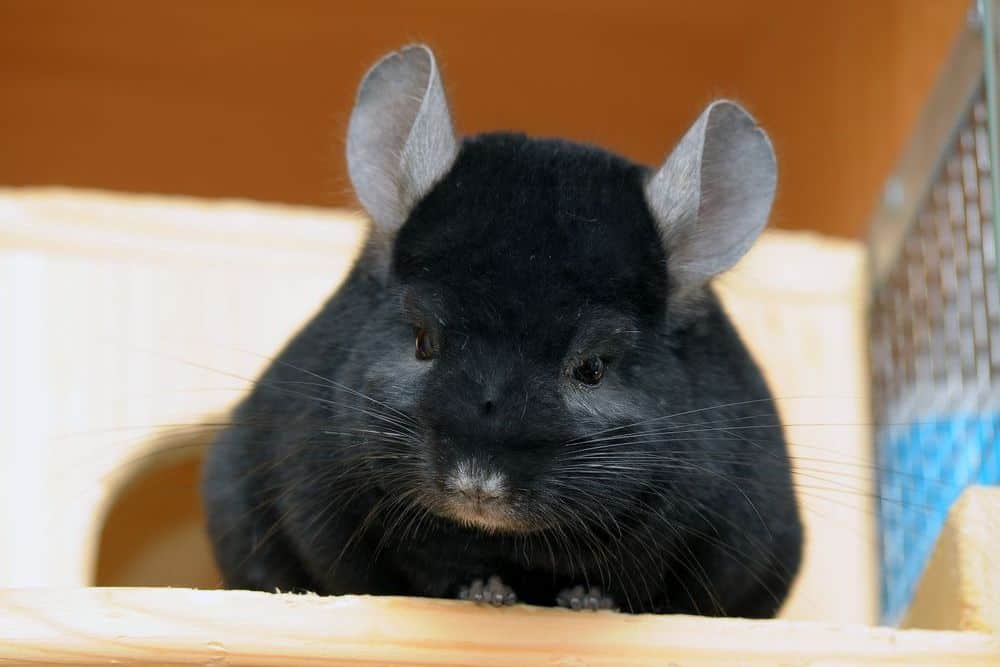
Now back to some good news. Sometimes your chinchilla may just grind its teeth for no good reason at all. This is often just because it is bored.
If this is the case, you should either get your chinchilla a new chinchilla mate to interact with, or spend more time with your chinchilla. Chinchillas are very social and friendly animals and can get bored or irritated with you quickly.
Socializing a chinchilla is an important step after the adoption. If you notice your chinchilla grinding its teeth, but smell no odor, and see no other unusual behavior from your chinchilla, it could simply be a case of you having neglected your pet a bit too much.
Spend more time with your chinchilla and give your chinchilla a large enough cage to stay active and have fun. That way, it will get bored like this again in the future.
Reason 4: Sending You A Message
Now, this reason resembles reason number 3 in many ways. We just discussed how your chinchilla may be grinding its teeth because it is no getting enough social time.
Now, let’s assume you are getting your chinchilla out for playtime and having it do all its natural chinchilla type behaviors.
If this is the case and you notice teeth grinding during specific interactions, like when you attempt to hold your chinchilla, for example, it may be sending you a message that it is annoyed.
Don’t take this the wrong way. Your pet loves you and recognize you as the owner, but it has things to do when it is out for playtime. It wants to jump, climb, and explore during these short spurts of time out of the cage.
If you keep interfering with what it wants to do, it may chatter to let you know a straightforward message: “I love you, but I have things to do.”
If this is the case, let it out in a safe area and let it do its thing. Learning how to recognize your chinchilla’s body language and what it is trying to communicate will get much easier as time passes. Don’t fret it much now.
How To Easily Tell What Is Causing Your Chinchilla To Grind Its Teeth
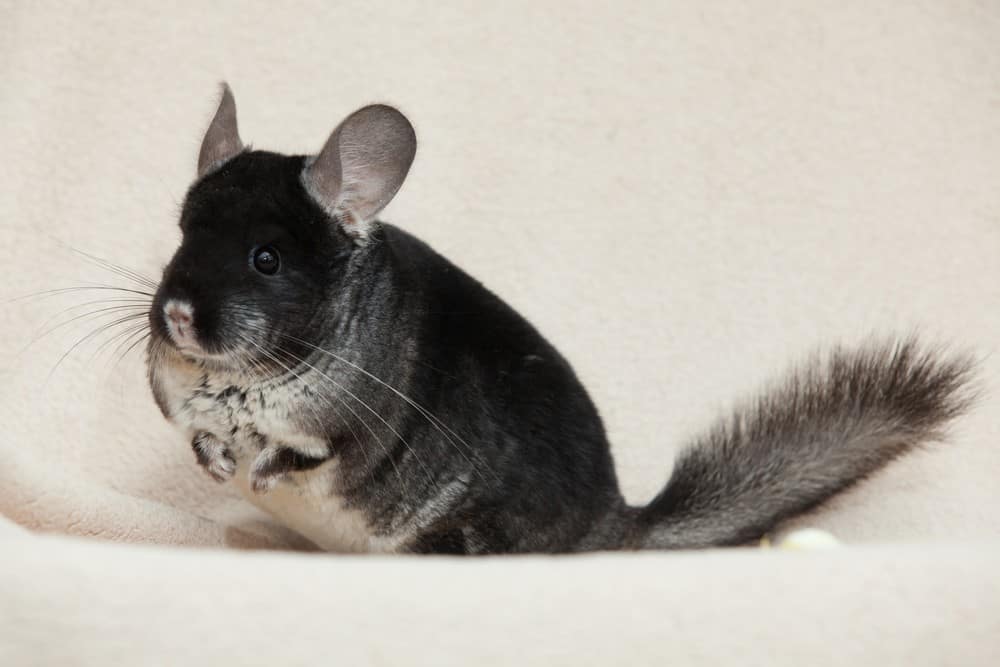
Unfortunately, chinchillas aren’t that easy in this respect. They are a straightforward animal to care for, but recognizing signals and body language can be a bit trickier with chinchillas.
The easiest way I can think of to narrow down the cause for teeth grinding is to pay attention to your chinchilla’s odor and other behavior.
If your chinchilla is emitting an odor, sleeping more than average, or seems agitated much more often than usual, there is a strong likelihood that it’s time to contact your vet.
Take your chinchilla in for a visit. There could be something more serious going on, if this is the case.
However, if your chinchilla is behaving normally, eating, drinking water, pooping and nothing much has changed, it’s likely one of the other three reasons causing your chinchilla to grind its teeth.
Chinchilla Grinding Teeth: Final Thoughts
As stated during this entire post, chinchillas can be challenging to understand with certain behaviors, and some teeth grinding or teeth chattering should not necessarily alarm you.
It’s the nature of owning a chinchilla, and they are still undoubtedly excellent animals to own.
I have no regrets about owning my chinchilla.
Be willing to find the root of the problem and adjust your routine to attempt to put an end to teeth grinding with your chinchilla.
Chili and I wish you the best of luck with your new chinchilla and the journey you have ahead of you.
What additional information can you share with the readers about a chinchilla grinding or chattering their teeth?
Does your chinchilla grind their teeth or chatter their teeth?
What have you noticed to be the primary cause of your chinchilla grinding or chattering their teeth?
How did you fix the problem?
Be sure to share those thoughts, stories, and concerns by dropping a comment below.
As always, Chili and I appreciate you stopping by and reading today and we will see you again next time!
Anonymous says
My chin started making a grinding noise after I gave her a dust bath with some new dust. I wasn’t able to ge the right dust for a while, so I think she enjoyed it. Compared to the other dust I had, it is a lot fluffier and soft. She might have been eating the dust because she was kind of rubbing her face. I haven’t had her for too long though and she’s only starting to let me pet her without telling me to leave her alone.